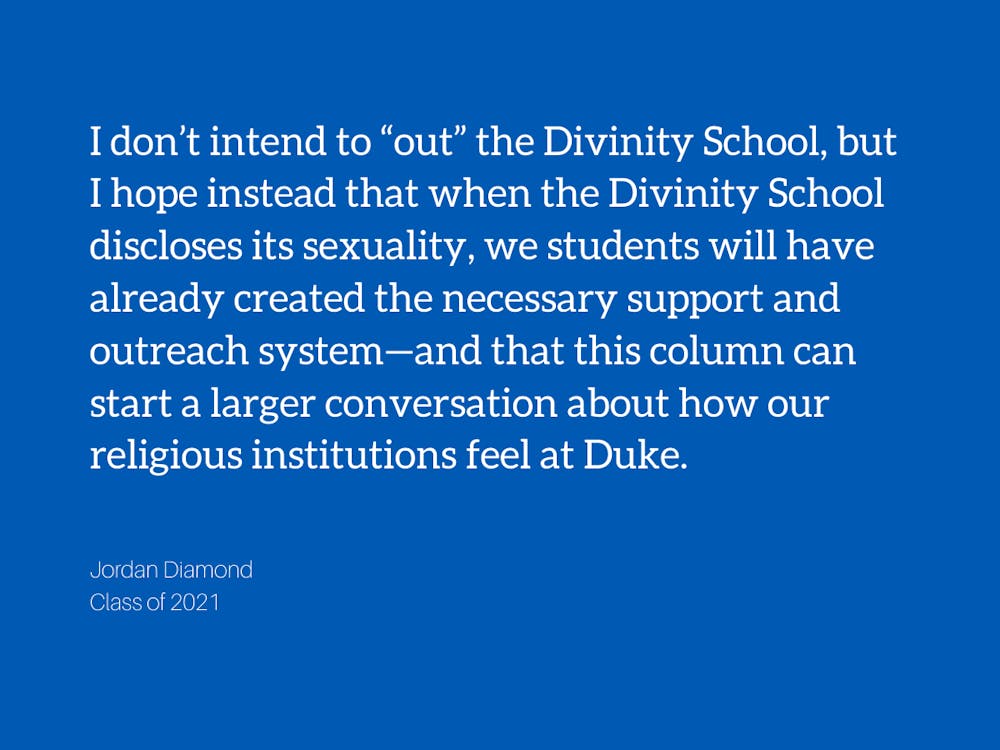The United Methodist Church is embroiled in controversy about its regressive stance against gay marriage. Duke’s Divinity School, a United Methodist Church seminary, has long found itself in the crosshairs of UMC’s tradition and student advocacy for better progress on queer issues. Lately, the school has considered its future given the possibility that UMC may split into different factions based on different congregations’ social values. Student advocates calling for condemnation of “UMC’s discriminatory LGBTQ policies” are important; however, they do not go far enough. It’s time for the Divinity School to come out as gay.
As a Jewish student, I’ll admit that I feel a little out of place commenting on UMC’s internal dynamics. For example, I lack the theological context to fully understand the “connectional polity” that distinguishes Methodism from other branches of Protestantism. Also, who is “Jesus?” Nonetheless, my gaydar is impeccable and I can always spot a closet case.
My intuition that the Divinity School is gay was confirmed when I walked past the chapel to class last week. I felt a pair of eyes on me, turned around, and caught the Divinity School in the act of checking me out before it became flustered and those gray bricks turned red in the face. We’ve all heard the rumors about what the Divinity School did with the Allen Building at convocation last year—so this flirtation was all the evidence I needed.
I don’t intend to “out” the Divinity School, but I hope instead that when the Divinity School discloses its sexuality, we students will have already created the necessary support and outreach system—and that this column can start a larger conversation about how our religious institutions feel at Duke. The Center for Sexual and Gender Diversity needs to reach out to the Divinity School, and make it aware of all the resources and organizations that Duke has for queer members of our campus community. Everyone in the Divinity School’s fraternity and social circles should be clear that they support the graduate program regardless of whom it loves. And we should all practice a bit more empathy and understanding when we’re reminded of the secrets that some of our peer buildings hold.
Edgardo Colón-Emeric, a UMC General Conference delegate and a Divinity School professor of reconciliation and theology, claims that he “does not yet know how he will use his vote” at this year’s General Conference in May regarding the proposal to separate UMC. Such indecisiveness on Church policy is reckless, especially after the Divinity School followed me on Instagram the other day and liked my last 20 pictures. The Divinity School’s leaders must immediately decide for the school to come out as gay so it can feel free to slide into my DMs.
Of course, coming out is a decision that shouldn’t just be made with regards to flirting with members of the same sex and in the context of social upheaval transferring expanding expectations of inclusion on religious movements. And seriously, I get it. Duke Divinity School was founded as the first graduate school at Duke in 1926, a time when gay people in North Carolina faced arrest and ostracization under sodomy and sterilization laws for homosexual behavior. And I don’t doubt that the Divinity School feels some responsibility for the ongoing discussion amongst its parent organization, the United Methodist Church, about splitting up after all the stress of this LGBTQ talk. But I want the Divinity School to know that it gets better—nearly 100 years after the school’s founding, I know tons of gay and lesbian Sunday Schools. Everyone knows that the Center for Jewish Studies is bicurious. Heck, the Mosque in my hometown is trans!
Just think about the precedent that the Divinity School’s coming out would set. The gay liberation movement of the late 1960s called for coming out and living an openly queer life as a basic form of activism to increase visibility and the organizing potential of queer folks. As such an important seminary, coming out would shine a light on all the other queer, Methodist education centers out there. But more importantly than paving the way for other educational institutions, the Divinity School needs to stand up and make this decision to be true to itself.
In the end, I know that a big part of the outside resistance to the Divinity School talking about its gayness is a fear that it will change and leave us. We’re all scared that our beloved graduate school will be bullied by bigots, or pack up and move out to San Francisco. But we have to support the Divinity School for who it is—a beautiful, bright, gay Methodist seminary. So next year at Durham Pride, I want to see the Divinity School leading the march carrying a big gay pride flag. I hope you’ll march alongside it.
Jordan Diamond is a Trinity junior. His column, “diamond in the rough,” runs on alternate Tuesdays.
Get The Chronicle straight to your inbox
Sign up for our weekly newsletter. Cancel at any time.

